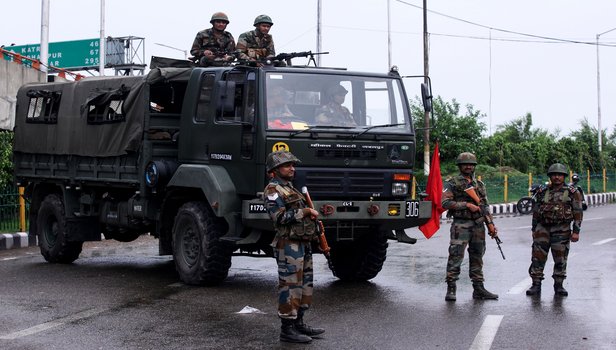India should not ignore China's reaction to Jammu and Kashmir
09 Aug 2019 ( IBTN News Bureau )
The Government of India's move to reorganize Jammu and Kashmir and divide it into two Union Territories has led to very serious reactions from many quarters.
The most significant response came from India's neighboring countries Pakistan and China, which control parts of Jammu and Kashmir province. India claims these parts.
It is important to remember that both these neighbors are rich in nuclear power and there is a special bond between them. These two have also fought a war with India.
India's relations with these two countries have been unfavorable for a long time due to border disputes and other tensions.
This background is enough to explain why the Pakistani leadership first had a detailed discussion with its commanders and the National Security Council and then convened a joint session of its Parliament.
It was proposed in Parliament that the United Nations Security Council be urged to call an emergency session on the steps taken by India.
Pakistan Army Chief Qamar Javed Bajwa has said that the army is ready to 'go to any length' to help the Kashmiris.
Prime Minister Imran Khan pointed to two possibilities on this decision of India. He again spoke of a suicide attack like 'Pulwama' and a possible war between India and Pakistan.
After the second meeting of the National Security Council, Pakistan officially announced a few policy decisions - recalling the High Commissioners, halting bilateral trade and rethinking India-Pakistan relations.
These reactions of Pakistan become important if we keep its important relationship with China at the center. Experts describe Pakistan as speaking the language of China while being under the protection of China.
As it has been during the tensions between India and Pakistan, this time also the response of China decided Pakistan's stand.
In the case of India, China has been using Pakistan as camouflage, while itself has always followed the steps. In such a situation, China's response, which has deep meaning, needs to be critically analyzed and interpreted.
First of all, on the global level, China is today a big country where even a small step of it seems very heavy. Especially when it comes to Asian affairs, it certainly has its identity as the largest country in every respect.
The world has seen China's expansionary policies in recent times. America and its allies oppose these expansionary policies of China.
China controls 38,000 square kilometers of Aksai Chin in Jammu and Kashmir province and more than 5,000 square kilometers of the Shaksgam Valley.
The Chinese response after this reorganization of Jammu and Kashmir has once again raised the already existing border dispute between the two countries.
China's Foreign Ministry spokesman Hua Chunying said, "China has always been opposed to including the territory of its western border into India's administrative region."
It is easy to understand why China reiterated this. But China's concerns are reflected in its statement - "Recently India has continued to undermine China's territorial sovereignty by changing its unilateral law. This is unacceptable and will not come into effect."
Of course, when such a statement came suddenly, the Indian Ministry of External Affairs also reacted to this and called it 'India's internal matter' and said that 'India does not comment on the internal affairs of other countries and hopes that other countries Will do the same.
Second, China is looking for a chance to present itself as a third umpire, focusing on the India-Pakistan tension as usual.
In his written reply, Foreign Ministry spokesman Hua Chuning said, "The parties concerned need to act prudently while exercising restraint and precaution. They should refrain from doing actions that may unilaterally change the status quo and escalate tensions." To resolve peacefully through dialogue and consultation on the dispute related to both sides and to maintain peace and stability in the region Insists.''
This Chinese response certainly goes against the feelings of the Simla Agreement and the constant cleanliness of India that China does not want any role of mediator or any other in India-Pakistan tension.
Not only this, it is also against the policy-based statements made by Chinese leaders from time to time on the issue of China. The result of Chinese Foreign Minister Chien Chenchen's statement in Nepal in 1989 to President Chiang Chemin's 1996 speech in the Pakistani Senate was the result of Prime Minister Nawaz Sharif raising the Kashmir issue in the Security Council in the 1999 Kargil War. Bluntly refused.
The Kargil War was the period when the best example of China's neutrality over the India-Pakistan tension was seen. But this will not happen in 2019.
Third, China's intention behind referring to the reorganization of Jammu and Kashmir as an issue between India and Pakistan is that it wants to convey that it is not an internal matter of India.
Recently, when US President Donald Trump said that Indian Prime Minister Narendra Modi asked him to play a mediating role in the Kashmir dispute, China insisted that the international community can play a constructive role in the settlement of the Kashmir dispute.
It should be taken seriously given its special relationship with Pakistan and its occupation over a large part of Jammu and Kashmir.
Fourth, China has expressed its grave concern that India has made a one-sided change in the status quo which can increase tensions in the region so much that China starts interfering in India's internal affairs. Now India needs to be cautious with China.
In March 1963, in the Sino-Pakistan border agreement, Pakistan handed over the occupied Shaksgam Valley to China.
Article-6 of the same agreement states that "After the settlement of the Kashmir dispute between Pakistan and India, sovereignty talks on the border will resume with the government of the People's Republic of China".
Does this not mean that China should remain calm until India and Pakistan reach a bilateral solution on Kashmir?
China is also shocked by India's decision to make Buddhist-dominated Ladakh a new union territory, bordering the autonomous region of Tibet.
Now this area is being directly under the central government of India where hundreds of Tibetan refugees including the Dalai Lama are living.
For this reason, Chinese Ambassador Yao Jing to New Delhi told the Indian media that Kashmir is "an internationally recognized disputed area" and that it is his responsibility as a local member of the Security Council to ensure peace and stability in the region.''
(Click here for Android APP of IBTN. You can follow us on facebook and Twitter)
Share This News
About sharing
-
 15 Nov 2025
Why did the Grand Alliance suffer a crushing defeat in the 2025 Bihar Assembly elections?: Analysis
15 Nov 2025
Why did the Grand Alliance suffer a crushing defeat in the 2025 Bihar Assembly elections?: Analysis
Why did the Grand Alliance suffer a crushing defeat in the 2025 Bihar Assembly elec...
-
 12 Nov 2025
LIVE: India, Pakistan launch probes after blasts in New Delhi, Islamabad
12 Nov 2025
LIVE: India, Pakistan launch probes after blasts in New Delhi, Islamabad
LIVE: India, Pakistan launch probes after blasts in New Delhi, Islamabad
-
 11 Nov 2025
Delhi Red Fort blast live: Terrorism law invoked in India after 13 killed
11 Nov 2025
Delhi Red Fort blast live: Terrorism law invoked in India after 13 killed
Delhi Red Fort blast live: Terrorism law invoked in India after 13 killed<...
-
 05 Aug 2025
At least four dead, dozens missing as flash floods hit north India village
05 Aug 2025
At least four dead, dozens missing as flash floods hit north India village
At least four dead, dozens missing as flash floods hit north India village
-
 12 Jun 2025
Air India flight crashes in Ahmedabad with more than 240 people on board
12 Jun 2025
Air India flight crashes in Ahmedabad with more than 240 people on board
Air India flight crashes in Ahmedabad with more than 240 people on board



